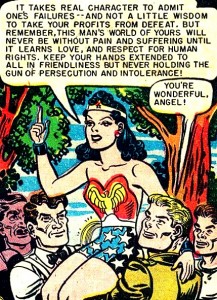Maria Werdine Norris is a final year PhD candidate at the London School of Economics and Political Science. Her research is on the British Counterterrorism strategy and legislation, with a focus on nationalism, security and human rights. You can find her on Twitter as @MariaWNorris
Click here for the introduction by Bobby Shortle, Talking Comics Editor in Chief

The practice and promotion of human rights is at its core about challenging invisibility. Too often, human rights activism is portrayed as a lofty ideal, comprising years of study and international activism. But in reality, human rights activism begins with respect for human dignity and the commitment to pull from the shadows those who are forgotten and oppressed.
We live in a world where countless people are invisible; where their lives and stories are not represented in the media or popular culture. Comic books are an aspect of popular culture where invisibility has historically been reinforced. Most comic book characters are male, white, straight and able-bodied. This is especially so in the superhero genre, which lead Julianna Aucoin, from the Harvard Political Review, to ask the following questions:
Why do super-powered genetic mutations select white people almost exclusively? Why, if super-soldier serum and weaponized armor allows for heroics regardless of natural strength, are there no super-strong women?
And as The A.V. Club’s Oliver Sava puts it, the answer is because straight white men dominate comic books, both inside and outside the pages. Just like in the real world, straight white men are still the ‘default‘. And yet, recent changes in the comics industry have also made it an arena where invisibility is being challenged at unprecedented levels. Just last week, Ross Richie, the founder and CEO of comic books publisher BOOM! sparked a social media wave with his call to push comics forward:
Have you ever had a friend that shared a lot of your interests, but they didn’t read comics? … They liked the idea of comics, but there wasn’t a comic book that felt like it was made for them… Let’s go make that comic book for them. Together. As fans, as creators, as retailers, as the press, as publishers. All of us. Let’s talk about how we can all Push #ComicsForward. Because comic books should be for everyone.
So starting today, we will do our bit to challenge invisibility, push comics forward and promote human rights. And we won’t be doing it alone. The LSE Human Rights Blog is very proud to be partnering with Talking Comics for this project. Talking Comics is a website that has been dedicated not just to comic books, but to fostering a community of fans. Through their podcasts (including The Missfits, a podcast run entirely by women), they have created a safe and progressive face for comic book fans who are deeply invested in the future of the medium and pushing it forward. All articles will be reposted on Talking Comics. Our hope is that by combining forces, we can reach both the human rights and the comics audience.
We will be publishing two articles a day until Sunday 8 February, including interviews with leading comic book creators such as Kelly Sue Deconnick and G. Willow Wilson. The writers that have contributed to this project are academics, journalists and bloggers, and they cover a variety of comic book titles. Organically, the articles have organised themselves around the theme of women in comics. This reflects a growing concern regarding female representation in comics, illustrative of the sexism which still permeates society as a whole. The tone of the articles is one of quiet optimism whilst still being aware of current problems within the industry.
It is our hope that this week will create new comic book readers. To make this easier, every piece will provide links to the digital version of the comics being discussed. When it comes to representation and popular culture, it is more important than ever that we vote with our wallets, our tweets and our voices as well as our hearts. Finally, we encourage you to share your thoughts on the articles and welcome your engagement on twitter and facebook with the hashtag #LSEComics.
Please join us for the ride.
Click here to read all of the Comics, Human Rights and Representation articles. This link will be updated throughout the week.



9 Comments